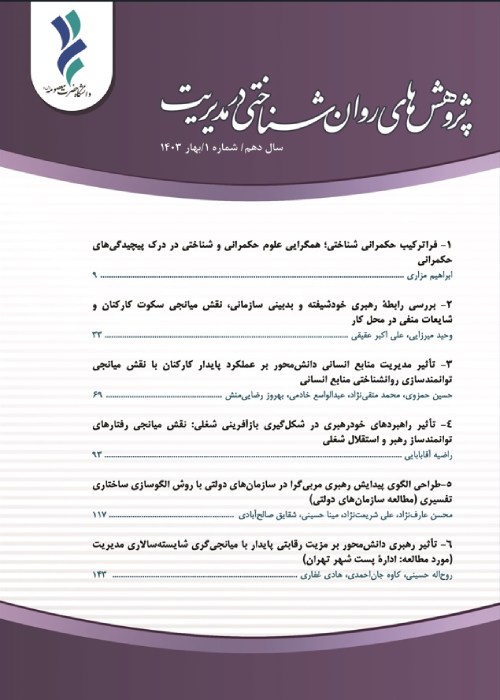Investigating the relationship between narcissistic leadership and organizational cynicism, the mediating role of employees' silence and negative rumors in the workplace
Knowing the factors to prevent organizational cynicism in the workplace has always been one of the preoccupations of the organization's management. The purpose of this research is to investigate the mediating role of employees' silence and negative gossip in the workplace in the relationship between narcissistic leadership and organizational cynicism in the workplace. What is obtained through the study is carefully analyzed to address managers and employees to find better ways to deal with the state of work environments.
Design/Methodology/Approach:
This research in terms of purpose, is practical, in terms of the data collection method, it is of field type, and in terms of the implementation method, it is descriptive and correlational. The statistical population consisted of all the employees of the five-star hotels in Mashhad, numbering 165 people, of which 115 people were selected as a statistical sample using Cochran's formula by simple random method. The information needed in the theoretical part was collected through library studies and the data needed to test the research hypotheses was gathered through the distribution of the 4-question questionnaire of negative rumors related to the work of Ko et al. (2015), Tangirala and Ramanujam's (2008) employee silence questionnaire with 5 questions and Hachwarter and Thomson's (2012) narcissistic leadership questionnaire with 16 questions. To measure validity, face validity and confirmatory factor analysis were used, and Cronbach's alpha coefficient was used to measure reliability. Cronbach's alpha of narcissistic leadership, behavioral cynicism, the silence of employees, and negative gossip in the workplace was calculated as 0.838, 0.836, 0.835, and 842 respectively. Data analysis was done by structural equation method with a partial least squares approach and Amos software.
The path coefficient between narcissistic leadership and organizational pessimism is significant. Therefore, employee silence partially mediates the direct effect of narcissistic leadership on organizational cynicism. Therefore, the first hypothesis is confirmed. The path coefficient between narcissistic leadership and organizational pessimism is significant. Therefore, negative rumors partially mediate the positive and direct effect of narcissistic leadership on organizational cynicism. Therefore, the second hypothesis is confirmed. The path coefficient between the two variables of narcissistic leadership and organizational pessimism is significant. Therefore, there is a direct and positive relationship between narcissistic leadership and organizational pessimism, and the third hypothesis is confirmed. The path coefficient between narcissistic leadership and employee silence is significant. Therefore, there is a direct and positive relationship between narcissistic leadership and employees' silence, and the fourth hypothesis is confirmed. The path coefficient between narcissistic leadership and negative work-related gossip is significant. Therefore, there is a direct and positive relationship between narcissistic leadership and negative work-related rumors, and the fifth hypothesis is confirmed. The path coefficient between employee silence and organizational pessimism is significant. Therefore, there is a direct and positive relationship between employees' silence and organizational pessimism, and the sixth hypothesis is confirmed. The path coefficient between the variable of negative rumors related to work and organizational pessimism is significant. Therefore, there is a direct and positive relationship between negative work-related rumors and organizational pessimism, and the seventh hypothesis is confirmed.
According to the first hypothesis, managers should avoid behaviors such as self-arrogance, exaggeration, lying, immorality, and prejudice that cause employee frustration and should pay attention to improving the performance of their subordinates. According to the second hypothesis, if managers do not abandon the narcissistic style, employees respond to their managers with jealous and harmful behaviors and use silence as a compromise strategy to prevent further abuse. According to the third hypothesis, by avoiding narcissistic leadership, managers can prevent negative work-related rumors and psychological disorders that arise from incompatibility between employees and the organization. According to the fourth hypothesis, to prevent organizational pessimism and increase employee participation, leaders should allow employees to express their opinions about organizational issues and avoid repressive behaviors. According to the fifth hypothesis, managers can make the employees think of each other and their interaction with the organization, prevent the occurrence of pessimism, and increase the productivity of the employees. According to the sixth hypothesis, managers should avoid arrogance, hand-holding, over-sensitivity, and thinking about their benefit, to avoid the silence of employees, which leads to undesirable consequences. According to the seventh hypothesis, managers can avoid creating tension at work with rational behavior and empathy with employees in the work environment, and by conducting positive evaluation conversations, they can avoid creating rumors in the workplace caused by a negative atmosphere and a poor work environment in the organization.
- حق عضویت دریافتی صرف حمایت از نشریات عضو و نگهداری، تکمیل و توسعه مگیران میشود.
- پرداخت حق اشتراک و دانلود مقالات اجازه بازنشر آن در سایر رسانههای چاپی و دیجیتال را به کاربر نمیدهد.


